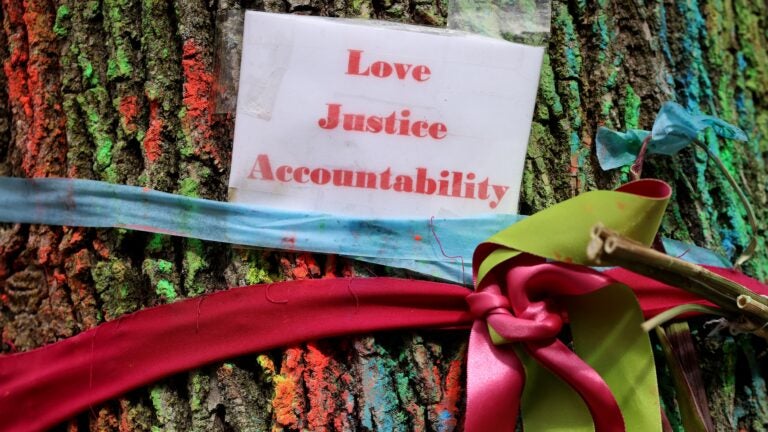Local News
Öztürk, a Turkish national targeted because she co-authored a pro-Palestine op-ed, could still fight for her release in a federal court in Vermont.

Rümeysa Öztürk, the Tufts graduate student who was arrested by ICE on a Somerville sidewalk last month, was denied bond Wednesday by a federal immigration judge in Louisiana.
After Öztürk was taken into ICE custody in Massachusetts, she was quickly moved to New Hampshire, Vermont, and then to a detention center in Louisiana. She remains there as her lawyers fight to, at the very least, have her returned to Vermont. They say the government violated Öztürk’s constitutional rights during her arrest and detainment.
Government lawyers argue that her case belongs in immigration court in Louisiana, where Öztürk sought release during a hearing Wednesday. That request was denied, according to her lawyers. The immigration judge concluded that Öztürk is both a flight risk and a danger to her community, they wrote in a document that was filed in the separate ongoing case in Vermont.
A federal judge in Boston transferred that case to Vermont earlier this month and barred the government from deporting her unless, and until, the Vermont court orders otherwise.
Öztürk is a Turkish national and former Fulbright scholar who is pursuing her PhD in child and human development at Tufts. The Trump administration revoked her student visa without notifying her, and a few days later ICE agents arrested her as she left her apartment to break Ramadan fast with friends. Video of the arrest went viral, prompting widespread anger.
The federal government, in a purported effort to fight antisemitism, is revoking the student visas of many linked in some way to pro-Palestine demonstrations. Öztürk co-authored an op-ed in The Tufts Daily last year that called for divestment from Israel and for administrators to more vocally acknowledge human rights abuses happening in Gaza. The State Department said that Öztürk “engaged in activities in support of Hamas.”
“Yesterday was a complete violation of due process and the rule of law. The immigration courts are cowering to the Trump administration’s attempts to silence advocates of Palestinian rights,” Marty Rosenbluth, one of Öztürk’s lawyers, said in a statement. “The government’s entire case against Rümeysa is based on the same one-paragraph memo from the State Department to ICE that just points back to Rümeysa’s op-ed.”
Öztürk has not been charged with any crime. The op-ed makes no mention of Hamas, and Öztürk was not known as an outspoken protest leader. Those that know her vehemently deny how government officials have characterized her. The government has not produced any evidence linking Öztürk to criminal activity on campus or support for terrorists. State Department officials concluded internally that there was no evidence showing Öztürk had any connection to antisemitism or terrorism, The Washington Post reported recently. She was detained anyway.
The decision to deny Öztürk bail Wednesday was based solely on a memo from the State Department, according to her lawyers. That memo, used to justify the revocation of her visa, only points to the op-ed and asserts Öztürk “found common cause with an organization that was later temporarily banned from campus.”
The op-ed was co-written by Öztürk and three other students identifying as “Graduate Students for Palestine.” In the piece they linked themselves to Tufts Students for Justice in Palestine, a group that led many demonstrations and was suspended by Tufts administrators months after the op-ed was published.
Judge William K. Sessions III, a federal judge overseeing the case in Vermont, is considering assuming jurisdiction. He heard arguments from both sides on Monday, and floated the idea of scheduling a hearing in Vermont so that Öztürk can challenge the legality of her detention and potentially be released while her removal proceedings are ongoing in immigration court. In that scenario, Öztürk would be brought back to Vermont for the hearing. He took the matter under advisement.
Öztürk’s lawyers insisted during Monday’s hearing that she does not pose a flight risk because of her ongoing studies. She has nine months left in her doctoral program, which she has been working toward for the past five years, they said. There are multiple crucial dates coming up in the spring and summer that Öztürk would not want to miss. Numerous letters submitted to the court attest to this fact and to Öztürk not being a danger to the community, they said.
Öztürk and her team also raised concerns about her health. She has suffered six asthma attacks in the three weeks that she has been detained, her lawyers wrote in the most recent court filing in Vermont.
Öztürk has described her experiences firsthand in court documents. In Somerville, she had been living in fear after discovering that she was on the radar of a shadowy group known as the Canary Mission that works to document “individuals and organizations that promote hatred of the USA, Israel and Jews on North American college campuses and beyond.”
Multiple students detained by the Trump administration have been listed by the Canary Mission, and the group’s work has also been used to detain students in Israel, according to New York Magazine.
When masked, plainclothes ICE agents swarmed Öztürk in Somerville and whisked her into an unmarked vehicle, she feared for her life, she said, according to the court documents.
“Rümeysa’s nightmarish experience at the hands of immigration officials has been nothing short of abhorrent, and last night’s decision by an immigration judge to keep her imprisoned is no exception. Our client has now been deprived of her most basic freedoms for 23 days for writing an op-ed,” Lia Ernst, legal director for the ACLU of Vermont, said in a statement Thursday. “This decision only underscores the need for the federal court to intervene on her behalf and order her release as soon as possible.”
Sign up for the Today newsletter
Get everything you need to know to start your day, delivered right to your inbox every morning.

